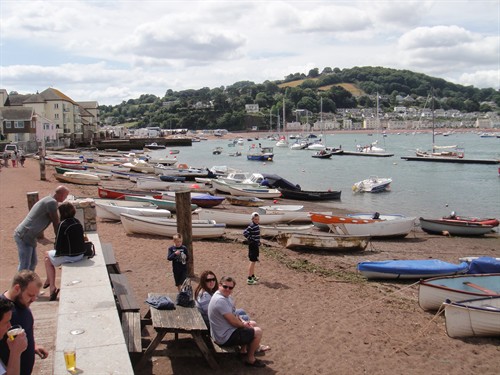
12/08/2015Phil's Travels - Teignmouth, England (07.15)
Phil's Travels - Teignmouth, England (07.15)
For three weeks this summer my son went Interrailing, visiting Amsterdam, Berlin, Prague, Budapest, Zagreb, Hvar and Split. I was paternally impressed when he returned without injury and the only loss being a pair of swimming trunks that somehow took an overnight flight to an irretrievable rooftop satellite dish. Quite rightly, my daughter decided she did not want to stay in stuffy London all that time without her fun brother and asked to spend a week with her grandparents in Devon.
We escorted our daughter and travelled to Dawlish by train. Our timing could not have been worse. The onset of summer holidays meant that the train had standing space only and to make matters worse when we stopped in Reading a sizeable girl band boarded with huge instrument cases. Given the ends of the train cars were full of people and luggage, the poor girls had to wriggle down the aisle and the passage became a forest of ladies and cello cases. For myself, I managed to rearrange some cases on the luggage rack and create a standing-desk for me to do some work.
Before leaving our daughter alone with her grandparents, we visited Teignmouth, just down the coast from Dawlish. This was my first visit to the port town, which is much bigger and busier than Dawlish. Where the latter appears to be getting quieter and quieter over the years, Teignmouth still draws a reasonable crowd. Teignmouth is an amazing river estuary. The River Teign flows out of Dartmoor down to the coast where it flicks aggressively to the right (starboard) before exiting into the English Channel. This flick creates a large tidal lagoon behind a massive sand bar that has been developed on over the years. The river side of the bar is called Back Beach, which is lined by beach huts and small cafes, and a plethora of small boats. The bay itself is full of boats and lined by a dainty industrial port to the east and the pricey exclusive village of Shaldon to the west.

Teignmouth was the last place in England to be invaded by a foreign power (in 1690, by French Admiral Ann Hilarion de Tourville). Since then, the port became a centre for privateering in the 17th century, was a base for the Newfoundland fisheries in the 19th century and became a resort in Georgian times. Teignmouth is also notable as the port from which Dartmoor granite was shipped to London to build the British Museum and other prestigious buildings in the capital.
We had lunch at the fabulous Crab Shack, situated on the old docks, a beautiful corner of yesteryear. The fresh crab caught by the restaurant's owner each day was served as a generous portion and delicious. The crabs grow big here because of the challenging tidal flows and tough environment. Nothing to do with crabs, in any way, but the Shack's WC is worthy of mention as possibly one of the loveliest WCs in Britain - beautifully finished and decorated with dozens of fun clocks.
The town centre and retail areas have some cute buildings, but generally speaking the street scape is pretty plain. The Front Beach, overlooking the Channel, has a long promenade and a deep garden area between the houses and hotels, and the actual shoreline. On this links land are numerous art installations, parks and play grounds, and befitting of mid-July busy with families.
The following day we left our daughter with her grandparents, and my lovely wife and I caught a Sunday afternoon train back to London. The short hop from Dawlish to Exeter was comfortable, with lots of space, and stunning views over Starcross and the River Ex. From Exeter to London, however, it was standing room only again (minus girl band unfortunately). It is good to see that Devon is still a popular holiday destination, but why can't the train companies program more trains when they know the route will be overwhelmed at this time of year and give a poor traveller a chance to sit down and enjoy the beginning and end of their well-earned break. Evidently, the mysterious ways of British Rail are still alive and well.
Media Centre